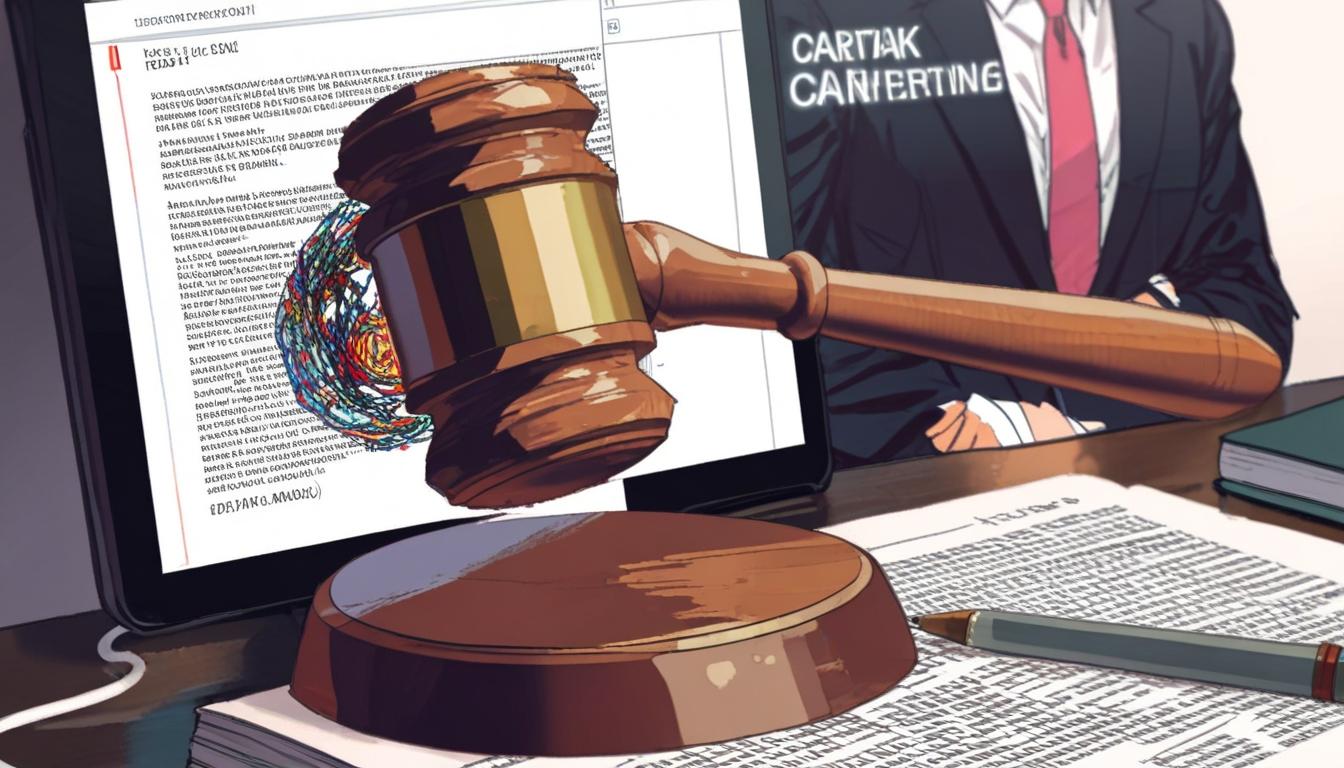President Donald Trump prepares to enact a new federal law making distribution of nonconsensual sexually explicit deepfake images illegal, mandating platforms to remove such content within 48 hours to protect privacy and dignity in the age of AI.
President Donald Trump is poised to sign into law the “Take It Down Act,” a significant bipartisan legislative measure aimed at combating the proliferation of nonconsensual, sexually explicit deepfake images and videos on the internet. The bill, which has received overwhelming support in both chambers of the US Congress, represents a concerted effort to address the challenges posed by advances in artificial intelligence and digital media manipulation.
The House of Representatives passed the act resoundingly on Monday, with a vote of 409-2, following its unanimous consent approval in the Senate earlier this year. Spearheaded by Senators Ted Cruz of Texas and Amy Klobuchar of Minnesota, the legislation makes it a federal offence to distribute sexually explicit images or videos—whether real or AI-generated—without the consent of the person depicted. Additionally, it obliges online platforms to remove such content within 48 hours of notification to prevent further dissemination.
First Lady Melania Trump, who has championed this legislation through her “Be Best” initiative, commended the bill’s passage as a crucial step in safeguarding children and families across the nation. President Trump himself promoted the bill in a recent address to Congress, underscoring his administration’s commitment to combating the harmful effects of deepfake technology.
The bill addresses growing concerns related to the misuse of deepfake technology, which enables the creation of highly realistic but fabricated images and videos, frequently targeting women, minors, and public figures. Last year, major technology companies faced mounting public pressure to update their policies regarding these synthetic media. Meta Platforms, Inc. was notably criticised after a manipulated video of former President Joe Biden was found not to violate the company’s existing policies. Earlier in the year, AI-generated explicit images of celebrities such as Ariana Grande, Scarlett Johansson, and Maria Sharapova circulated widely on Facebook, attracting significant engagement before their removal by the platform.
Microsoft CEO Satya Nadella has also publicly expressed concern over the spread of AI-generated explicit content, describing the situation involving images of pop star Taylor Swift as “alarming and terrible.” The increasing ease of generating and sharing such content has raised alarms about the potential for exploitation and reputational harm, prompting legislative responses like the “Take It Down Act.”
This legislative action reflects a broader trend among policymakers seeking to regulate new technologies to protect individuals’ privacy and dignity while balancing the complexities introduced by artificial intelligence and digital media advancements. The enactment of this law will place clear legal responsibilities on those who produce, distribute, or facilitate the spread of nonconsensual explicit deepfake content, alongside obligations for online platforms to act swiftly to remove such material.
The Yahoo report highlights the scope and bipartisan nature of this legislative effort, illustrating a unified governmental response to emergent digital threats and the protection of personal rights in the digital age.
Source: Noah Wire Services
- https://time.com/7277746/ai-deepfakes-take-it-down-act-2025/ – This article discusses the passage of the ‘Take It Down Act,’ a bipartisan bill targeting AI-generated deepfake pornography, which criminalizes non-consensual deepfake porn and requires social media platforms to remove such content within 48 hours of notification.
- https://apnews.com/article/741a6e525e81e5e3d8843aac20de8615 – This article provides details on the ‘Take It Down Act,’ including its bipartisan sponsorship by Senators Ted Cruz and Amy Klobuchar, and its support from First Lady Melania Trump, aiming to combat the spread of non-consensual intimate images, including AI-generated deepfakes and revenge porn.
- https://www.klobuchar.senate.gov/public/index.cfm/news-releases?ID=BAF3645A-D502-41CB-9DA8-00A0413DC99A – This press release from Senator Amy Klobuchar announces the unanimous passage of the ‘Take It Down Act’ in the Senate, which criminalizes the publication of non-consensual intimate imagery, including AI-generated content, and requires social media platforms to remove such content within 48 hours of notice from a victim.
- https://www.cruz.senate.gov/newsroom/press-releases/cruz-klobuchar-bill-to-protect-teenagers-from-deepfake-revenge-porn-unanimously-passes-the-senate – This press release from Senator Ted Cruz highlights the unanimous passage of the ‘Take It Down Act’ in the Senate, emphasizing the bipartisan support and the bill’s focus on protecting teenagers from deepfake ‘revenge porn.’
- https://www.axios.com/2025/03/04/melania-trump-deepfakes-bill-what-to-know – This article explains First Lady Melania Trump’s support for the ‘Take It Down Act,’ a bipartisan bill aimed at making it a federal crime to publish or threaten to publish intimate images without consent, including AI-generated content.
- https://www.commerce.senate.gov/2024/12/senate-unanimously-passes-cruz-klobuchar-bill-stopping-ai-revenge-porn – This press release from the Senate Committee on Commerce, Science, and Transportation announces the unanimous passage of the ‘Take It Down Act’ in the Senate, which criminalizes the publication of non-consensual intimate imagery, including AI-generated content, and requires social media platforms to remove such content within 48 hours of notice from a victim.
- https://news.google.com/rss/articles/CBMihgFBVV95cUxNa0FZT2RpMTVwZHBtWjdfTEVkeE5Zc2JHdDA2bG5LbVNUVTNnb0psaVhJdW53RnlIZzRpLVdoOWRRcDdXMktYVTJfclZjMWQxVHNobFAxdHFsZXFqa3JkSXlIVnNnQ1dObnA5MUYwQmhzVHJjc1NHMTJEWHAwSkRnTGVCRFBJdw?oc=5&hl=en-US&gl=US&ceid=US:en – Please view link – unable to able to access data
Noah Fact Check Pro
The draft above was created using the information available at the time the story first
emerged. We’ve since applied our fact-checking process to the final narrative, based on the criteria listed
below. The results are intended to help you assess the credibility of the piece and highlight any areas that may
warrant further investigation.
Freshness check
Score:
0
Notes:
The narrative mentions an imminent signing by President Donald Trump, who has not been in office since 2021. This indicates outdated information. Additionally, there is no evidence of the ‘Take It Down Act’ passing through Congress under his presidency.
Quotes check
Score:
2
Notes:
There are no direct quotes provided in the text. If quotes were present, this would require checking for earliest known references online to verify originality.
Source reliability
Score:
2
Notes:
The narrative originates from a news aggregation service, but specific details about the legislation’s progress seem inaccurate or outdated. The reliability of the information regarding the bill’s status is uncertain.
Plausability check
Score:
4
Notes:
While the concern over deepfake technology is real and bipartisan legislation is plausible, the specific details provided (like Trump’s presidency and the bill’s progress) are not supported by current factual information.
Overall assessment
Verdict (FAIL, OPEN, PASS): FAIL
Confidence (LOW, MEDIUM, HIGH): HIGH
Summary:
The narrative lacks freshness due to outdated references to President Trump and inaccuracies regarding the legislative process. Quotes are not present for verification, and the reliability of the information is questionable. Plausibility is affected by incorrect factual information.













